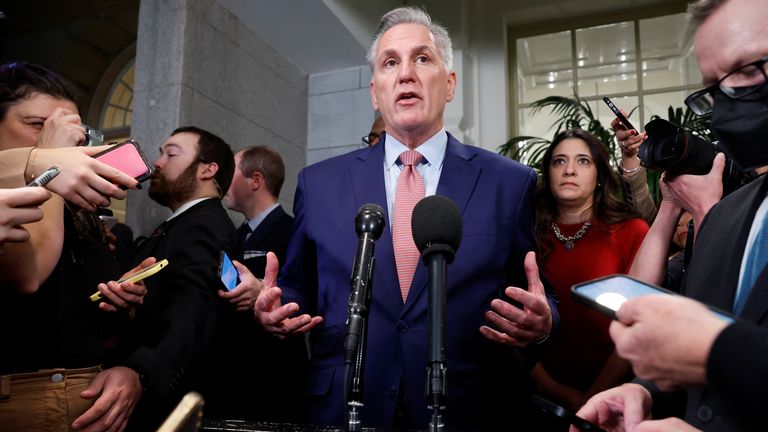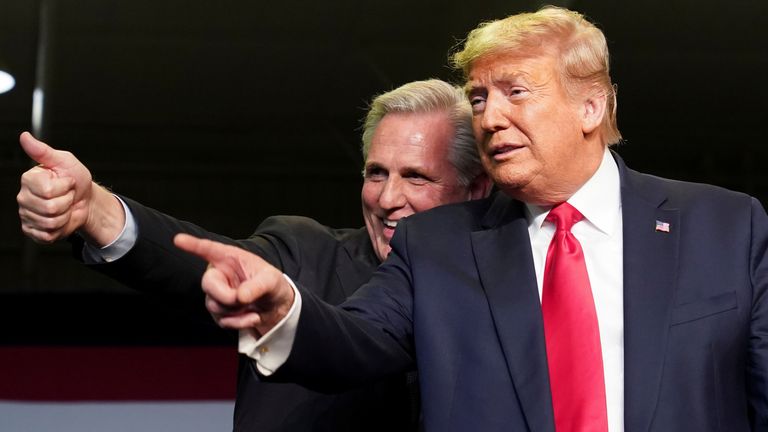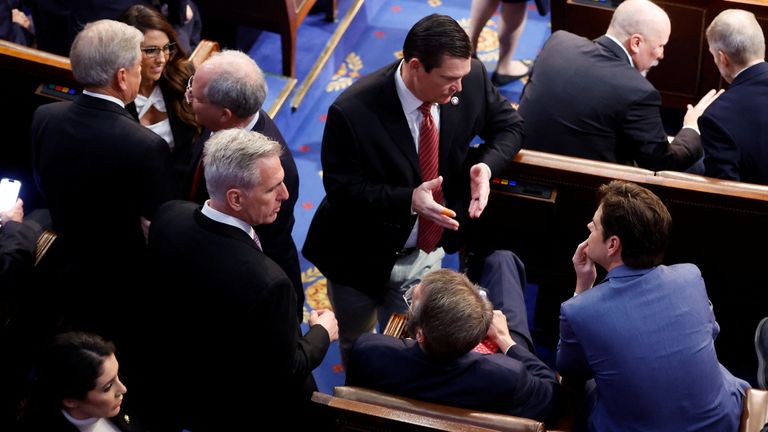Nations and political systems differ greatly but it is difficult not to see parallels between what is happening now in the US Republican party and the recent history of the UK Conservative party.
There is a brutal tussle under way over the direction which should be taken by Anglophone conservatism, as embodied a generation past by Margaret Thatcher and Ronald Reagan.
Last year, the turmoil in Britain’s ruling party resulted in three prime ministers in a matter of months, as Tory MPs failed to agree on leaders capable of governing the nation reliably.
The Republican party actually “won” the mid-term elections for the lower House of Congress, taking control from the Democrats.
But as the 118th Congress met for the first time this week, the new majority party failed to agree on their first order of business, who should be their leader, for the first time since 1923, 100 years ago.
Although they share the same title, and preside over proceedings in their house, the US Speaker does not have the same role as the Speaker in the House of Commons.
Like his predecessors, Sir Lindsay Hoyle is expected to be neutral and has abandoned his ties to Labour. By convention the UK Speaker is effectively an incumbent, irrespective of general elections when he or she stands without opposition from the main political parties.
The Speaker of the House of Representatives is an entirely partisan figure. In practice they are the leader of the majority party, which makes them the equivalent of prime minister in UK terms.
In the US Constitution the Speaker is second in the line of succession to the Presidency, after the vice president. (Confusingly the Veep is also the presiding officer in the upper house, with the casting vote in the US Senate.)
The likes of Speakers Tip O’Neill, Newt Gingrich, Paul Ryan and Nancy Pelosi have made much of their role as major national political figures.
When there is no Speaker in place, the House of Representatives is what one frustrated congressman this week called “a useless entity”. Its members cannot be sworn in, so they cannot legislate or hold the executive to account. They don’t even have security clearance.
When, as now, the Presidency and the Senate are controlled by the other party, the Speaker of the House is more important than ever as the equivalent to the Leader of the Opposition.
When Kevin McCarthy, an eight-term congressman from California, led his party to victory over the Democrats in the mid-terms by 222 seats to 212, the Republicans might have been expected to stick with his leadership and to install him in the top job .
But no. In 11 painful roll call votes McCarthy failed to get the required overall majority of representatives because 20 members of his own Republican party resolutely refused to back him, including five US Representatives elected for the first time.
Meanwhile the Democrats settled immediately and unanimously on Hakeem Jeffries of New York as their minority leader, replacing Pelosi who has retired. Jeffries is the first African-American to lead a party in the US Congress.
The overwhelming majority of House Republicans – 201 out of 222 – back McCarthy but without most of the 20 holdouts they did not have enough votes to put him over the top on 218.
Nineteen of those blocking McCarthy belong to the right-wing Freedom Caucus. Their motivation is best summed up by the controversial congressman from Florida, Mike Gaetz, who declared “If you want to drain the swamp, you cannot put the biggest alligator in charge”.
“The swamp” is the fetid American version of what British populists like to write-off as the “Westminster bubble”.
Gaetz’s extremist language carries echoes of Jacob Rees-Mogg’s pronouncement that Rishi Sunak’s policies are “socialist”.
McCarthy is not a centrist member of the establishment. He courted and promoted candidates belonging to the Tea Party. He hesitated briefly after the attack on the Capitol on 6 January 2021, but within days voted against impeachment and flew to Mar-a-Lago to seek Donald Trump’s endorsement. McCarthy embraced the “big lie” that Trump won in 2020, and voted to challenge the official electors in key states.
If he becomes speaker, McCarthy says his first priority will be to cancel the hiring of 87,000 tax inspectors. He will also block the crucial bipartisan budget measures already agreed in the Senate.
He has promised to change the rules to make it easier to sack a speaker (a bit like the 1922 Committee and votes of no confidence). This eventually won “MY Martin” the backing of Trump on his own Truth Social platform: “He will do a good job and maybe even a GREAT JOB”.
Politically he is not much different from those refusing to back him but they still don’t trust him. Instead they deliberately plunged US politics into chaos, at one stage proposing an alternative candidate, Jim Jordan, who had himself nominated McCarthy.
Read More:
Why the Republicans are struggling to pick a new House speaker
The midterms were a referendum on the extreme, right-wing politics of the ‘Make America Great Again’
Partisan Democrats relished their opponents’ plight and tweeted out images of the popcorn they were munching as the drama unfolded.
A critical columnist in The New York Times found it “grimly amusing to see that the party of insurrection can’t even manage the orderly transfer of power to itself”.
But the progressive newspaper took a more serious tone assessing the consequences of the refusenik’s behaviour: “They simply will not relent and join their colleagues even if it is for the greater good of their party, and perhaps the nation. They consider themselves conservative purists who cannot be placated unless all their demands are met – and maybe not even then. Their agenda is mostly to defund, disrupt and dismantle government, not to participate in it.”
The UK’s Conservatives have not disappeared down this rabbit hole. It is difficult to imagine Tory MPs celebrating the removal of metal detector arches, as symbols of oppression rather than security, as some Republicans did this week. Nor do they celebrate the right to bear arms.
Yet such groups as the European Research Group have been willing to use obstructionism and their position as de facto swing voters to force the bulk of their party in a more right-wing direction in policy and personnel matters.
They too have abandoned party loyalty in favor of ideology, allegedly supported by unelected and energized party activists.
On both sides of the Atlantic they have endorsed purges of those they disagree with in what was a “broad church” type of party. Their energy is focused on fighting within their own party for control. Provided their party can eke out election wins, they disregard those who don’t vote for it.
Whether they call it the swamp or the bubble their suspicion of government and its agencies comes with demands for a smaller state, welfare cutbacks, skepticism about climate change measures, less regulation of business, and curtailed civil rights.
Click to subscribe to the Sky News Daily wherever you get your podcasts
The essential difference is that a significant minority of Republican representatives think that the best way to achieve their goals is to disrupt and overturn the system while the overwhelming majority of Conservative MPs still want to work within it.
Many Tory MPs disagree profoundly with the right’s atavism but, for self-preservation, they look over their shoulders anxiously before speaking up for One Nation values.
So far those most effective in forcing the Conservatives in a rightward direction have been outsiders. Significantly, in praising the Brexit negotiator Lord Frost this week, Nigel Farage bellowed “now is the time for all good men to leave the Conservative Party”. Farage’s sidekick Richard Tice relaunched their Reform Party.
Last year, the British public suffered the consequences of the unquiet soul of the right. This year the Republicans are already offering another lesson in real time.



